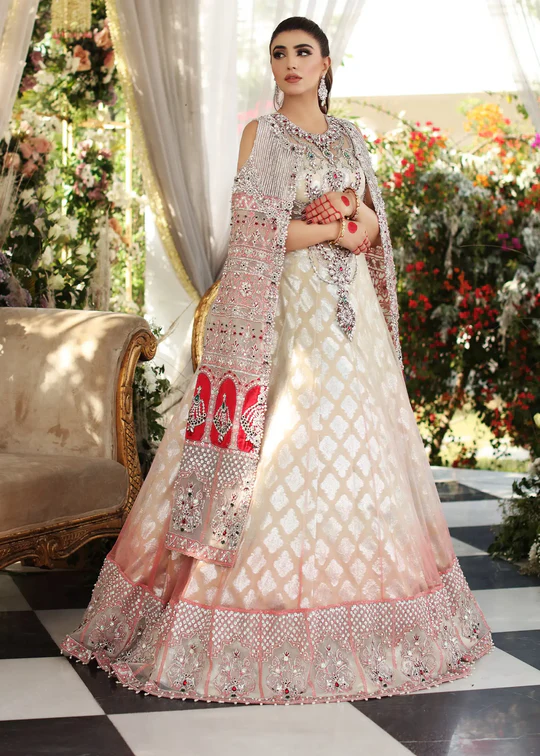An Ode to Heritage: Rema Ahsan’s Farshi Lehenga Creations

Heritage fashion holds a mirror to history, reflecting the vibrant traditions and stories of generations past. One such gem is the Farshi Lehenga, a regal attire rooted in South Asian culture. At the forefront of its revival is Rema Ahsan, a designer who has dedicated her craft to preserving this rich legacy.
The Legacy of Farshi Lehenga
The Farshi Lehenga traces its origins to the Mughal era, when it symbolized opulence and grace. Characterized by its floor-grazing silhouette and intricate embellishments, it was a staple for noblewomen. Over the years, it adapted to the changing tides of fashion, yet its essence remained untouched.
Understanding the Structure of a Farshi Lehenga
Unlike contemporary lehengas, the Farshi Lehenga features a distinctively flared skirt paired with a long, trailing dupatta. The ensemble's charm lies in its luxurious fabrics like silk, brocade, and velvet, often adorned with zardozi or chikankari embroidery.
Rema Ahsan: A Visionary Designer
Rema Ahsan is a name synonymous with the preservation of cultural heritage through fashion. Her journey into the world of traditional clothing began with a deep appreciation for history and an acute awareness of its fragility. Recognizing the fading prominence of traditional attire like the Farshi Lehenga, she set out on a mission to breathe new life into this extraordinary garment.
Signature Elements of Rema Ahsan’s Farshi Lehengas
What sets Rema Ahsan apart is her ability to blend authenticity with innovation. Her designs retain the intricate hand embroidery, rich fabric choices, and traditional silhouettes that are the hallmark of Farshi Lehengas. At the same time, she introduces subtle modern touches to cater to today’s fashion-savvy audience. Her work often incorporates a palette inspired by Mughal art, with delicate motifs such as peacocks, floral vines, and architectural patterns.
The Art of Revival: Bringing Heritage to Life
Reviving a centuries-old garment comes with its challenges, but Rema Ahsan has turned these hurdles into opportunities.
-
Reimagining Tradition: By giving the Farshi Lehenga a contemporary edge—such as lighter fabrics and innovative cuts—she makes it accessible to younger generations.
-
Educating Audiences: Her work is as much about design as it is about storytelling. Through interviews, fashion shows, and exhibitions, Rema highlights the garment’s history and significance.
-
Crafting Timeless Aesthetics: Every piece in her collection tells a story, blending elements of cultural pride with the elegance demanded by modern couture.
Cultural Resonance in Modern Times
Farshi Lehengas have found a special place in today’s cultural celebrations, from high-profile weddings to grand festivals. Their grandeur resonates with the ethos of these occasions, making them a sought-after choice for brides and attendees alike.
Rema Ahsan’s Global Reach
Rema Ahsan’s designs have crossed borders, captivating international audiences. Her participation in global fashion weeks and collaborations with overseas boutiques have introduced Farshi Lehengas to a wider clientele. Her collections appeal not only to South Asians but also to those drawn to the opulence and artistry of traditional attire.
Sustainability in Heritage Fashion
In an era where sustainability is paramount, Rema Ahsan ensures that her designs align with eco-friendly principles.
-
Eco-conscious Materials: She incorporates natural fibers, organic dyes, and recycled materials in her designs.
-
Fair Trade Practices: By partnering with local artisans and ensuring fair wages, she creates a positive socio-economic impact while preserving traditional craftsmanship.
Empowering Artisans through Farshi Lehenga Revival
At the heart of Rema Ahsan’s work is her commitment to empowering the artisans who bring her visions to life. She collaborates with skilled craftspeople from rural areas, ensuring that their traditional skills are preserved and celebrated. This collaboration not only revitalizes dying art forms but also provides these artisans with financial stability and global recognition.
Styling a Farshi Lehenga for the Modern Bride
Farshi Lehengas are a perfect blend of tradition and sophistication, making them a stunning choice for modern brides.
-
Accessories: Pairing the lehenga with statement jewelry such as polki sets or antique jhumkas enhances its regal appeal.
-
Makeup and Hair: Neutral tones and traditional hairstyles like buns adorned with flowers complement the look beautifully.
-
Footwear: The ensemble pairs best with embellished juttis or handcrafted sandals for added elegance.
Celebrity Endorsements and Media Recognition
The allure of Rema Ahsan’s creations has not gone unnoticed by celebrities. Bollywood actresses and influencers often flaunt her designs at red-carpet events and weddings. Media outlets have extensively covered her work, spotlighting her role in reviving South Asian heritage through fashion.
Challenges in Keeping Heritage Alive
Despite her success, Rema Ahsan faces challenges in sustaining the relevance of traditional garments in an era dominated by fast fashion. Educating consumers about the importance of heritage and combating the high costs associated with handmade designs remain ongoing battles.
Why Farshi Lehengas Remain Timeless
The timeless appeal of Farshi Lehengas lies in their ability to connect wearers to their roots. The craftsmanship, cultural resonance, and elegance of these garments transcend time, making them a treasure for every generation.
Conclusion
Rema Ahsan’s Farshi Lehenga creations are more than just garments; they are an ode to heritage, a bridge between past and present. Her dedication to reviving and reimagining this traditional attire ensures that its legacy continues to shine in the modern world.





